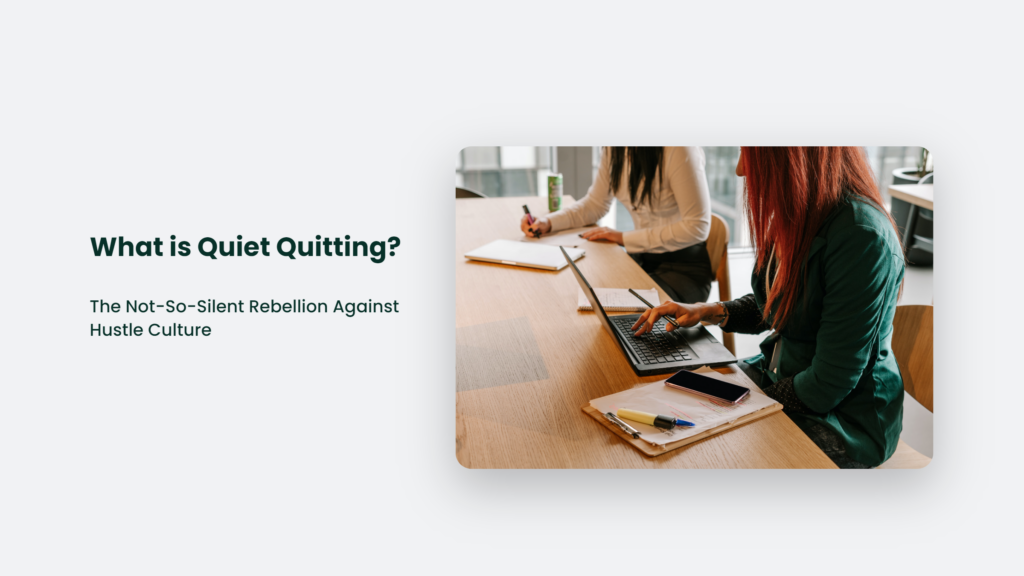The whirlwind surrounding “quiet quitting” first stirred in July 2022 when Zaid Khan, a twenty-something engineer, posted a TikTok video of himself talking over a montage of urban scenes. “I recently learned about this term called quiet quitting, where you’re not outright quitting your job, but you’re quitting the idea of going above and beyond,” Khan said in the now-viral video.
“You’re still performing your duties but no longer subscribing to the hustle-culture mentality that work has to be your life. The reality is it’s not. And your worth as a person is not defined by your labour.”
The #quietquitting hashtag quickly caught fire on TikTok, with countless users offering their own takes on the anti-hustle movement. Traditional media outlets took notice shortly after. Less than two weeks after the original video, The Guardian published an explainer: “Quiet Quitting: Why Doing the Bare Minimum at Work Has Gone Global.” So, Let’s find out what is quiet quitting.

The Rise of Hustle Culture and Its Discontents
“Quiet quitting” touches a nerve because it challenges the hustle culture that has become pervasive, especially among millennials and Gen Z. Hustle culture glorifies overwork, encourages unpaid overtime in pursuit of career advancement, and ties self-worth to productivity.
But the dark side of hustle culture is burnout, anxiety, and poor work-life balance. A Gallup poll found that the largest group reporting being “not engaged” at work are those born after 1989. The suffocating grimness has hit hard for Gen Z workers who have known nothing but hustle culture.” Your labour does not define your worth,” Khan said defiantly in his TikTok video. This sentiment clearly resonates with younger workers who feel immense pressure to overwork in order to “prove” their worth.
What is Quiet Quitting?
Urban Dictionary defines quiet quitting as:
Doing the bare minimum at your job so you don’t get fired. You’re not outright quitting but not going above and beyond. You’re just doing the bare minimum to collect your paycheck.
So, quiet quitting isn’t about total disengagement or laziness. It’s about rejecting hustle culture’s demands to work excessive unpaid hours, sacrifice your mental health and work-life balance for career advancement, and tether your self-worth to productivity metrics.
Quiet quitters still perform their core job duties punctually. But they draw clear boundaries and don’t buy into the notion that work must be the centre of one’s life.
Why Quiet Quitting Evokes Strong Reactions
As quiet quitting gained steam on TikTok under the #quietquitting hashtag, it evoked strong reactions from all sides:
- Supporters lauded the pushback against hustle culture and the re-centring of mental health and work-life balance. Many shared their own soul-crushing experiences with overwork.
- Critics blasted Quiet quitting as lazy, entitled behaviour demonstrating poor work ethic. “If you’re a quiet quitter, you’re a loser,” CNBC’s Kevin O’Leary proclaimed.
- Managers worried about declines in productivity and losing their top performers.
- Leadership Experts cautioned that quiet quitting often signals deeper issues with company culture, leadership, and manager-employee dynamics.
The polarized reactions underscore how deeply entrenched hustle culture has become. For older generations, quiet quitting may seem like indifference or laziness. But for younger workers, it symbolizes rejecting the notion that work must be life’s centre of gravity.
Quiet Quitting: A Generational Divide
Although people of all ages have embraced quiet quitting, it is fundamentally a Gen Z phenomenon. It is clear from its TikTok origins and the survey data on declining engagement.
For Gen Z, the first generation to come of age entirely online, the boundaries between work, leisure, and identity are extraordinarily porous. Gen Z workers project carefully curated personal brands that merge their jobs, hobbies, passions, and personalities into unified wholes on TikTok, Instagram, and other social platforms.
However, the pandemic’s seismic disruptions led many Gen Z’ers to realize this entanglement of work and self was unhealthy and unsustainable. Their self-worth had become too tethered to productivity and work persona.
For Gen Z, quiet quitting represents the messy, necessary work of separating personhood from job performance. Older generations remember facing this same struggle.
Signs Your Employees Are Quiet Quitting
As a manager, how do you know if your team members are quietly quitting? Signs may include:
- Declining willingness to take on extra work outside core hours
- Pushback on requests seen as excessive
- Less engagement in non-mandatory meetings or activities
- Prioritizing personal life over work obligations
- Doing the bare minimum to get by
Rather than getting frustrated, view quiet quitting as a warning sign to examine your management culture.
How Leaders Can Respond to Quiet Quitting
Here are some tips for leaders:
- Don’t demonize it. Accept that younger workers have a different relationship with work. Meet them where they are.
- Reflect on your culture. Does a toxic level of overwork permeate your workplace? Are unreasonable demands burning people out?
- Check your management style. Do you micromanage? Undervalue work-life balance? Neglect employee well-being?
- Improve work conditions. Reduce excessive workloads. Offer flexibility. Respect days off and vacation.
- Strengthen engagement. Give workers autonomy. Enable growth. Foster inclusion. Make sure effort is recognized.
- Communicate. Have honest conversations to understand employee perspectives. Bridge generational divides.
Frequently Asked Questions:
Isn’t quiet quitting just being lazy or disengaged?
It’s not about total disengagement or laziness. Quiet quitters still perform their core job duties punctually. But they establish boundaries and don’t subscribe to the belief that work must be life’s centre of gravity.
How can managers respond positively to quiet quitting?
Managers should avoid demonizing quiet quitting. Have open conversations to understand employee perspectives. Reflect on whether unreasonable demands are causing burnout. Offer more flexibility and respect for work-life balance. Strengthen engagement by enabling growth, autonomy and recognition.
Is quiet quitting just for younger generations like Gen Z?
While especially prevalent among Gen Z, quiet quitting resonates across generations. Millennials facing burnout have embraced it too. Even some Boomers are pushing back on outdated norms of overwork. It represents a cultural shift towards healthier work-life integration.
Quiet Quitting: An Evolution in Progress
Rather than a trend to be vilified, quiet quitting represents a generation’s first attempt to establish healthier work-life integration. Of course, this evolution will sometimes be messy, imperfect, and frustrating. But progress requires patience and willingness to listen on all sides.
Work will always be essential for providing structure, purpose, and meaning. But it should not subsume our entire identities and existence. Quiet quitting is the first step toward more sustainable work cultures honouring our shared humanity.


![The ‘Giveaway Piggy Back Scam’ In Full Swing [2022]](https://www.cjco.com.au/wp-content/uploads/pexels-nataliya-vaitkevich-7172791-1-scaled-2-683x1024.jpg)

